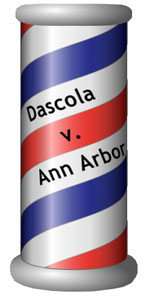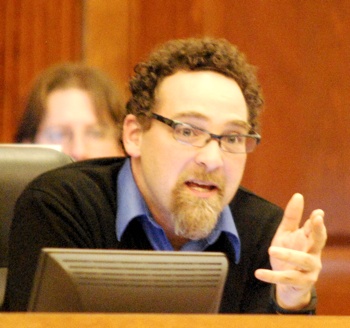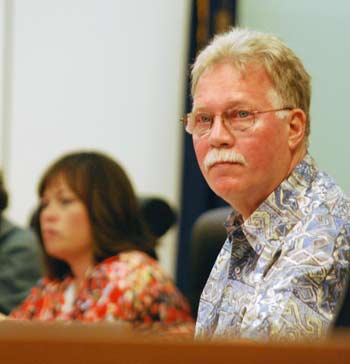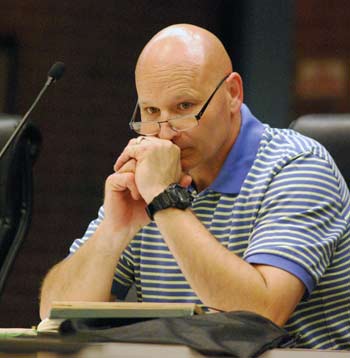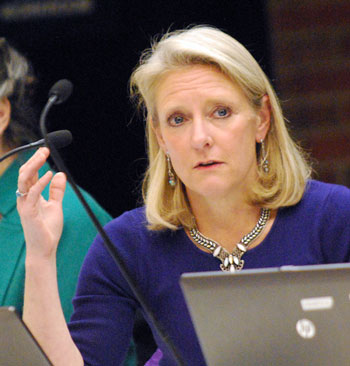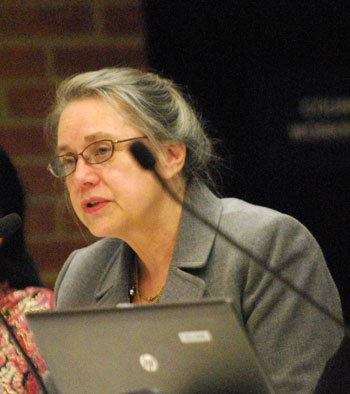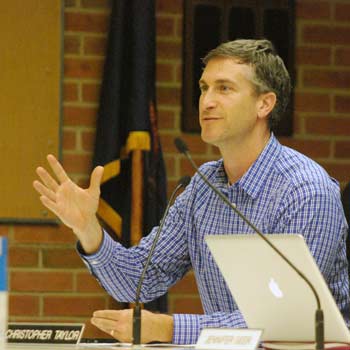Earlier this year, longtime downtown barbershop owner Bob Dascola announced his intent to compete for the Democratic nomination to represent Ward 3 on the Ann Arbor city council. And on March 12, 2014, Dascola took out nominating petitions from the city clerk’s office.
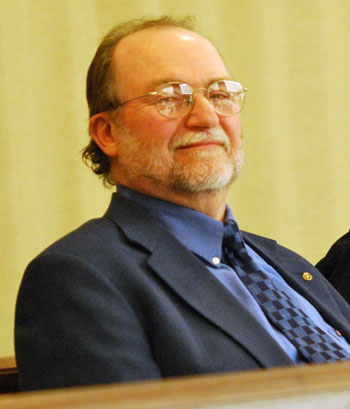
Bob Dascola sitting in the audience of the April 19, 2011 Ann Arbor city council meeting. On that occasion, he addressed the council during public commentary on the topic of panhandling in the State Street area, where his downtown barbershop is located. (Image links to Chronicle report of that council meeting.)
But Dascola was subsequently notified by the city clerk that he did not meet city charter eligibility requirements to represent Ward 3 on city council for this election cycle.
Dascola will be challenging the city clerk’s conclusion based on court cases from the early 1970s.
The Ann Arbor city charter includes two time-based eligibility requirements for city office: (1) a requirement that any local elected official must have been registered to vote in the city for a year before election to office; and (2) a requirement that a city councilmember must have been a resident of the ward they’re elected to represent for at least a year before being elected.
Dascola has lived on Baldwin Avenue in Ward 3 for about a year and a half, he told The Chronicle, but he did not register to vote in the city until Jan. 15, 2014. So he appears to meet the residency requirement, but not the voter registration requirement.
However, both of those Ann Arbor city charter provisions were explicitly ruled unconstitutional in federal court cases dating from the early 1970s.
So Dascola will be asserting his right to compete in the Ward 3 primary. He is represented in the matter by attorney Tom Wieder.
In a telephone interview on March 15, Wieder indicated that if “friendly persuasion” does not result in a change to the city’s position, then he’s prepared to move forward to file a lawsuit to ensure that Dascola can run.
And in the meantime, Wieder told The Chronicle, Dascola will be collecting signatures and submitting them to the city clerk as soon as possible. Dascola confirmed by phone that he was collecting signatures on the afternoon of March 15 – a change from an earlier strategy of waiting until the matter is sorted out.
Wieder ventured it is possible that based only on the charter language, someone might in good faith think that Dascola would not be eligible to represent Ward 3 if he were elected this year. But two separate federal court orders – one from Jan. 12, 1972 and the other from March 29, 1972 – struck down as unconstitutional the Ann Arbor city charter residency requirement and voter registration requirement, respectively.
It does not appear likely that a July 30, 2002 ruling by 22nd circuit court judge Timothy Connors might play any role in the resolution to Dascola’s case. The Wojack case – also handled by Wieder – involved the 2001 candidacy of Republican Scott Wojack to run in Ward 1. Wojack was told he could not run based on the in-ward residency requirement. He was allowed to run. But after the 2001 election, Connors issued an opinion upholding the charter residency requirement.
However, according to Wieder: “A state court cannot overturn an existing, binding decision of a federal court on the same subject.” Further, the Wojack case involved the residency requirement, not the voter registration requirement. And it is the voter registration requirement that appears to be the basis of the city’s conclusion on Dascola’s ineligibility. [Full Story]




